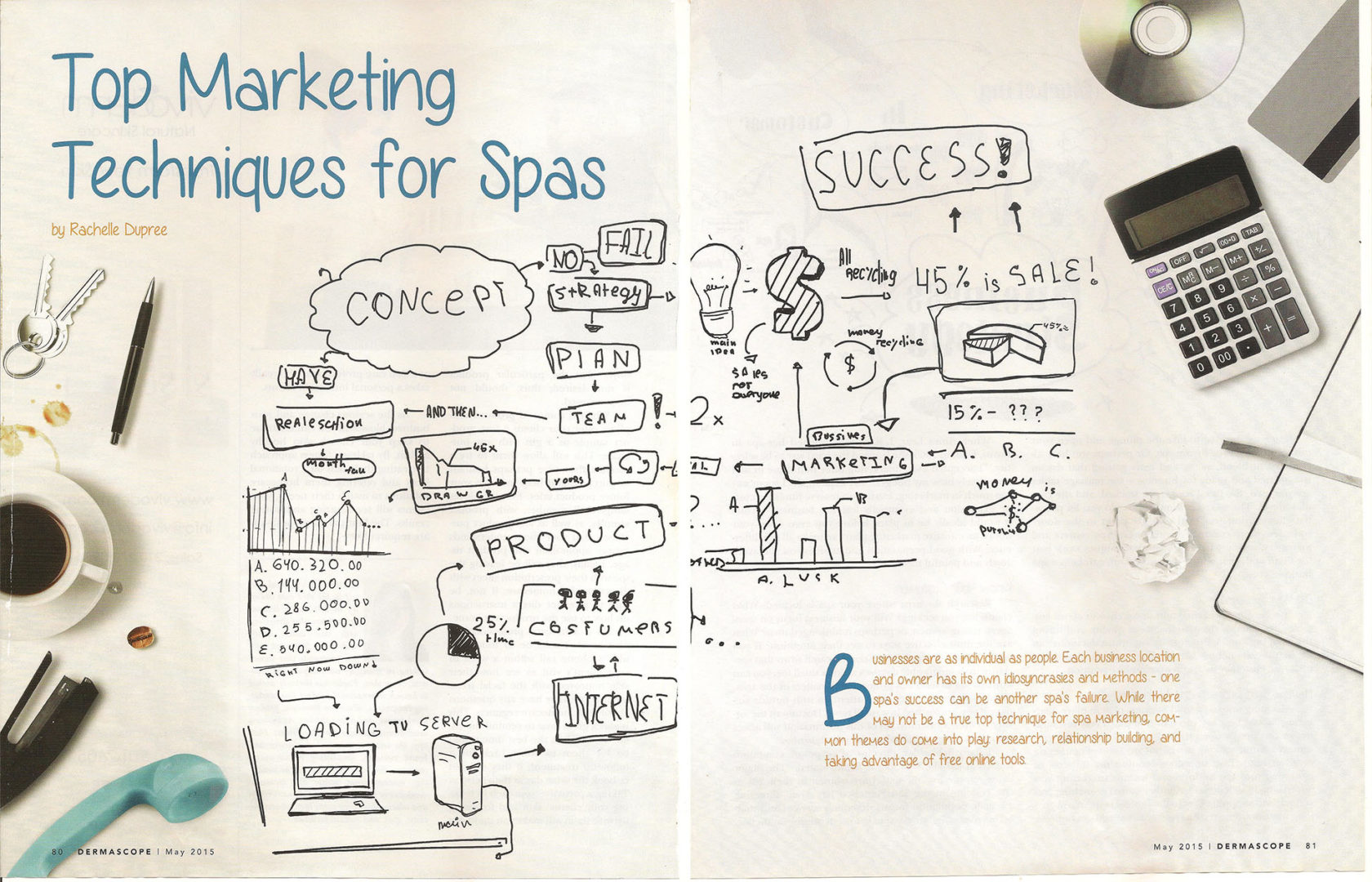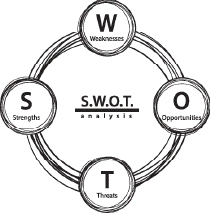
This article was first published in print for Dermascope Magazine, May 2015: (© 2015)
Top Marketing Techniques for Spas
Businesses are as individual as people. Each business location and owner has its own idiosyncrasies and methods – one spa’s success can be another spa’s failure. While there may not be a true top technique for spa marketing, common themes do come into play: research, relationship building, and taking advantage of free online tools.
You have decided to take the plunge and open your own business – your dream spa. Or perhaps you have already spent blood, sweat, and tears getting that dream spa opened and ready for business – the massage tables are prepped, the facial rooms are stocked, and the candles are lit. The next question is, how do you let potential clients know you exist and get them in the door? Interviews were conducted with several spa owners and managers, asking what marketing techniques work best for them and what advice they would offer to help a spa business grow.
 Do Your Research
Do Your Research
It is easy to get excited and make choices about tangibles like interior decorations, towel quality, and hiring the right personnel. But equally important decisions can lie in the intangibles like product patents, workforce turnover, customer lists, and marketplace position.
Have a Solid Business and Marketing Plan
Assuming one has a solid business plan in place, marketing should be a key piece of that plan. Very few businesses can simply open their doors and expect the customers to come walking in without any form of marketing or advertising. Take into consideration the full cost of operating your spa business and include marketing and advertising in that budget. A little number crunching and comparison shopping before the budget is spent will go a long way toward helping a spa stay afloat and get noticed.
When Amra Lear, L.E., L.M.T. opened her spa in Provo, Utah in 2005, she learned the hard way to be selective. “I accepted every marketing offer that came in and completely blew my budget,” she explained. “I spent way too much in marketing, leaving no reserve funds for costs or expansion and eventually lost the business.” While it would ideally be in place before you even open your doors, an effective marketing plan can make all the difference. With good preparation and analysis you can avoid costly and painful mistakes.
Know Your Customer
Research the area where your spa is located. What clients are you seeking? Will your business focus on teenagers, young women, or perhaps middle-aged men? What are the most effective ways to get their attention? If you are in a large city, look for market research firms that specialize in demographic databases. For a small fee, you can buy that list to send out promotional mailers in the area. Perhaps you will attract more attention with outside signage if you are located in a small town. Document the answer to these questions. All of this information will affect your marketing methodology for your business.
Tiffany Schneider, director of corporate communications at LaBelle Day Spas & Salons stated, “The major demographic for our spa[s] are women in their 20s to 60s, residing in the San Francisco Bay Area. Targeting a female population means designing services and marketing campaigns that speak to a feminine audience. For instance, we predominantly use images of women in this age range in our advertising collateral. In terms of location, we focus on networking in the local community through donations, providing services to local events, and using community media.”
 Perform a S.W.O.T. Analysis
Perform a S.W.O.T. Analysis
“S.W.O.T.” stands for strengths, weaknesses, opportunities, and threats. Do a thorough evaluation of your business and your local competitors. Uncover places where your spa may be weak or might not offer the same benefits as your competition. Think like a potential client and list the reasons why they might choose another spa over yours. Then, put action plans or goals in place to overcome your weaknesses or competitive threats. Understanding your strengths can also become the platform for your services and future marketing campaigns.
If you attempt to offer everything to everyone, dreams of growth and profitability can easily derail your new business. “Focus on one or two things you do really well and excel at those on top of other things,” advises Kathryn Leverette, acne specialist and owner of Clinically Clear Medi-Clinic in Oakland, Calif. If you attempt to compete by offering every spa service imaginable, you might soon find yourself over your head and out of resources and money. If your expertise lies in facials and massage and you know little of waxing or pedicures, then focus on the facials and leave the rest to someone else.
Some of the greatest success stories in history were preceded with a multitude of failures (see Thomas Edison and Abraham Lincoln, for instance). As many successful business owners might tell you, sometimes learning what not to do is just as important as doing the right thing.
Stick to the Basics First
While marketing has evolved into greater technologies and avenues over the years, the basics never change. The most extensive marketing campaign in the world will be useless if no one answers your phone or your website does not function well. The majority of spa owners interviewed said overwhelmingly that being active in their community and forming close relationships with clients was their number one marketing advantage. “We find that the best marketing for customer retention is providing excellent customer service and monitoring client feedback online such as on Yelp or Google,” explains Schneider. Spa owners advised that the simple act of a phone call or hand-written note can go a long way towards connecting to clients and attaining their loyalty.
 E-mail Marketing
E-mail Marketing
The second most successful marketing tool was offering coupons and discounts. These can be communicated through e-mail blasts, text messages, Facebook posts, or more personalized postcards and birthday cards to current clients or target demographic sets.
Know the difference between hounding a client and connecting with them on occasion. E-mail once a month or less or call on their birthday with a special discount offer. It does not have to be over-the-top to get results. If you are the type to send out three e-mails a week and post 100 messages to Twitter each day, chances are high you will lose that client for simply being annoying. “Coupons drive business and make existing clients happy in both print and e-mail formats,” claims Schneider.
Some recommend the “lost customer” e-mail, saying “we miss you” with a 10 percent-off coupon or “Two for Tuesday,” with the second service half-price or “Black Friday BOGO.” You can develop hundreds of your own themes based on your services and budget.
Another successful technique is to ask clients to pre-book their next appointments before they leave the salon. Lear claimed, “Customers were more willing to commit to future appointments on the spot than to call at a later time.”
Radio, television, and print advertising were hit or miss for some spas. For example, while some received great response from radio, others found little value or measurable results. Again, tracking data metrics is key to understanding what works best for each individual business. If you are unsure how to find these numbers, go to the source. Most radio and television stations have entire departments fully-committed to tracing and reporting their listeners and viewers.
Get Your Online Ducks in a Row
As the world of technology grows, so do the options for reaching clients and new customers. Today, dozens (if not hundreds) of ways exist to connect to the public. Many of them are low-cost or completely free. One would be crazy not to take advantage of these free marketing avenues.
Use free social media platforms like Facebook and Twitter as a newsfeed to provide regular updates to your clients about upcoming events or promotions. Pinterest and Instagram can drive interest with quick and appealing images of your spa or events without worrying about content. Use online directories like Googlemaps and Yelp to make sure your name is out there and provide multiple communication avenues for your potential customers to reach you.
 Leverette claims her most valuable marketing tool has been a combination of radio and taking full advantage of the Internet and all it offers. She has spent much of her time becoming an expert on website development and getting her website to the first-page ranking of Google. She recommends using every free online tool available, including learning how to use search engine optimization and keywords to your advantage. Google Ad Words Express, Yelp, and sponsored advertisements were also top performers. Schneider stated, “Online deals have been successful at bringing in new customers, particularly venues with a target market that are upper-scale such as LivingSocial, which features deals on things to do in a particular city. We find that public relations drive new clients both in spa and for our products, particularly when there are national write ups or local bloggers who give a positive review of the business.” Once you decide which online venues to set up, take the time to create your website and social media pages with care.
Leverette claims her most valuable marketing tool has been a combination of radio and taking full advantage of the Internet and all it offers. She has spent much of her time becoming an expert on website development and getting her website to the first-page ranking of Google. She recommends using every free online tool available, including learning how to use search engine optimization and keywords to your advantage. Google Ad Words Express, Yelp, and sponsored advertisements were also top performers. Schneider stated, “Online deals have been successful at bringing in new customers, particularly venues with a target market that are upper-scale such as LivingSocial, which features deals on things to do in a particular city. We find that public relations drive new clients both in spa and for our products, particularly when there are national write ups or local bloggers who give a positive review of the business.” Once you decide which online venues to set up, take the time to create your website and social media pages with care.
First Impressions Count
Make sure phone calls are answered and messages are promptly returned. Create a website that is beautiful and functional and regularly update your social media websites. All of these things contribute to what a potential customer might think of your spa before they even walk in the door and whether they will take the next step to book an appointment.
 Use your website as a virtual, high-resolution brochure: provide menus, pricing, pictures, and full contact information. If your website doubles as an online retail storefront, make sure to keep all product images and information up to date. Note: Never use copyrighted images or images copied from the Internet without permission or purchase. There are plenty of great low-cost options for buying professional stock images online
Use your website as a virtual, high-resolution brochure: provide menus, pricing, pictures, and full contact information. If your website doubles as an online retail storefront, make sure to keep all product images and information up to date. Note: Never use copyrighted images or images copied from the Internet without permission or purchase. There are plenty of great low-cost options for buying professional stock images online
and elsewhere.
Do not rely solely on social media to do the connecting for you. In recent years, some social media giants have turned to more profit-making options that do not always benefit small business owners. According to technology and marketing expert Elan Dekel, contributor to
Forbes.com, “Business owners who spent time and money building their Facebook page discovered in 2013 that Facebook is showing their posts to just a tiny fraction of their fans. If they want all their Facebook fans to see their posts, they now need to pay Facebook.” Ten years ago, MySpace was all the rage, Facebook was an inter-network for ivy-league college students, and Twitter was just an idea. Social media has become a great tool to help keep us connected, but it is just that – a tool. And tools, especially technology-based ones, will come and go. Take advantage of the free options first before you spend your budget on unknowns. Concentrate on what you have control over, like your direct e-mail lists and client contact information.
 Search Engine Optimization
Search Engine Optimization
While it has been in effect for years, search engine optimization (SEO) is a fairly new term to most people. In the most basic definition, SEO is a system of processes, keywords, and techniques that help attract more visitors to your website. It can be complex or simple, depending on the amount of time you are willing to spare. If necessary, you might even find it beneficial to outsource your website optimization. Just be careful to choose a reputable company based in your country to assure that content is written well and grammatically correct. SEO has become invaluable to many businesses and in some cases has made the difference between longevity and failure.
As you improve your online marketing campaigns with regular metrics, you can begin to filter out what works best for your spa business and what to leave behind.
So pay attention to the basics. Keep your business and marketing plan current, connect with your clients through
 more personal interactions and always keep your online presence up-to-date and attractive. You can go a long way to keep that spa dream alive and thriving.
more personal interactions and always keep your online presence up-to-date and attractive. You can go a long way to keep that spa dream alive and thriving.
 Rachelle Dupree has over 20 years of experience in marketing, media, and communications. She earned a bachelor’s degree in communication arts and marketing and a second degree in graphic design. She studied with a Denver-based herbalist and naturopath for four years, combining her marketingknowledge with her love of natural remedies. She currently contracts as a marketing and communications director for Vivoderm Natural Skincare and various design clients.
Rachelle Dupree has over 20 years of experience in marketing, media, and communications. She earned a bachelor’s degree in communication arts and marketing and a second degree in graphic design. She studied with a Denver-based herbalist and naturopath for four years, combining her marketingknowledge with her love of natural remedies. She currently contracts as a marketing and communications director for Vivoderm Natural Skincare and various design clients.

Comments